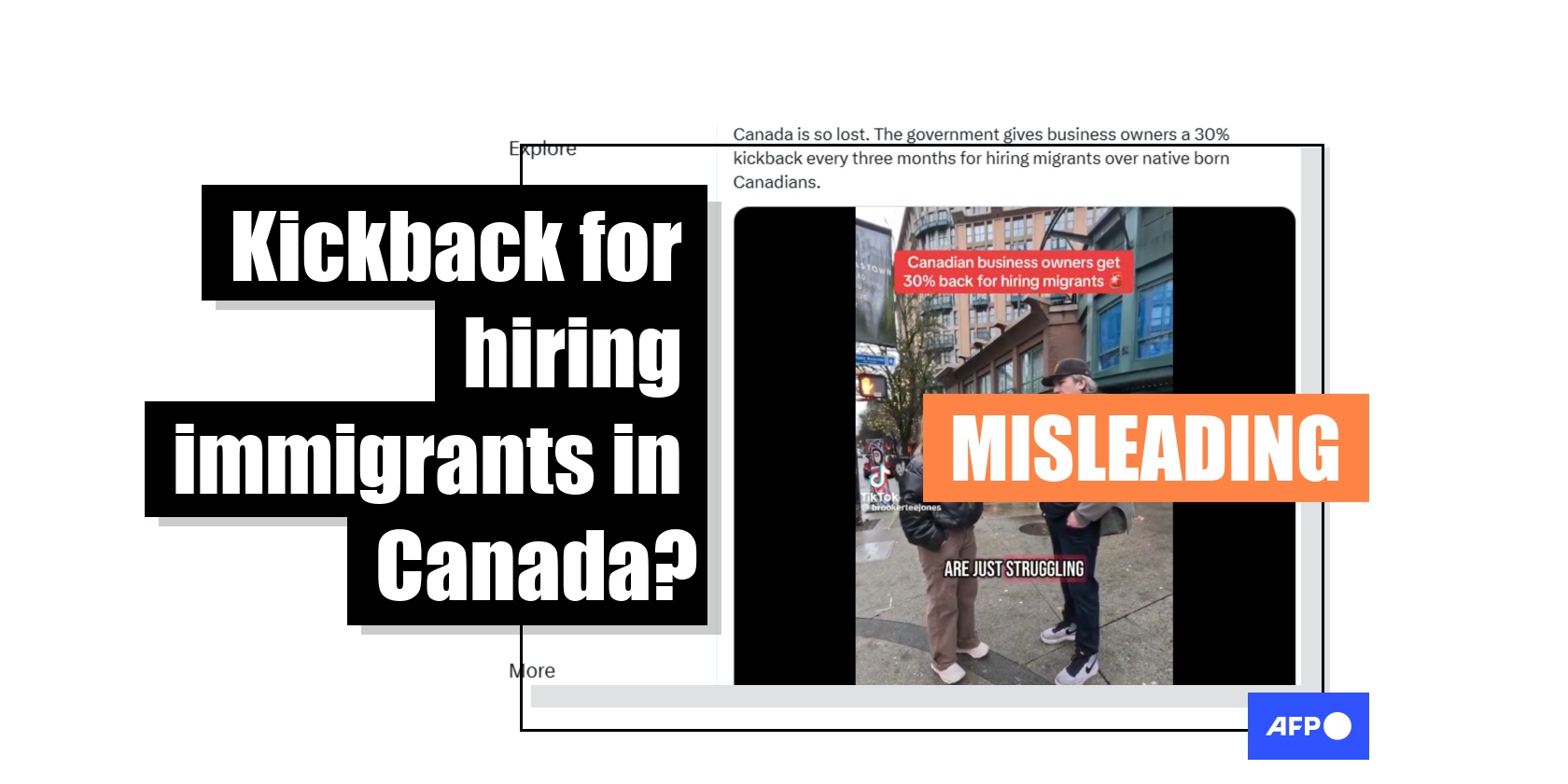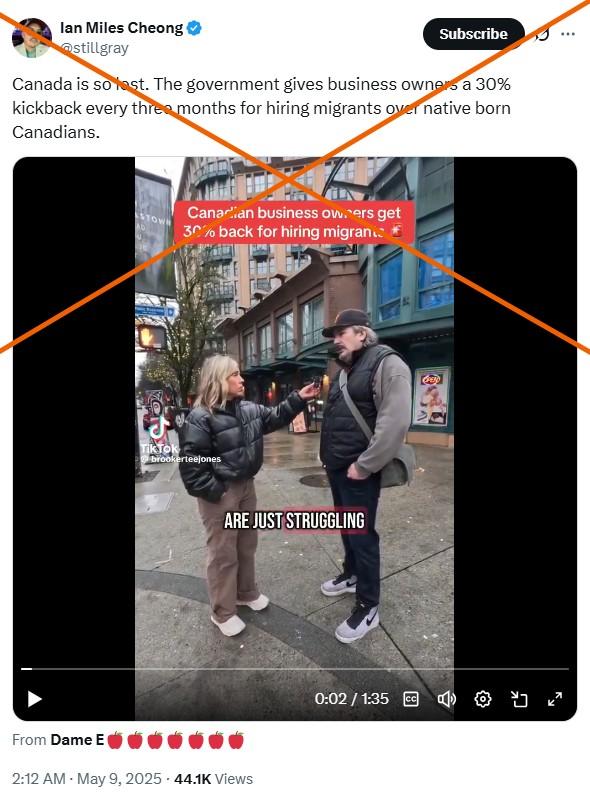
Canadian foreign worker aid misrepresented
- Published on May 16, 2025 at 23:05
- 4 min read
- By Gwen Roley, AFP Canada
"Man exposes the Canadian businesses who get a 30% kickback for hiring migrants," claims the caption of a May 11, 2025 Instagram video.
In the clip, a woman interviews a man who claims business owners can benefit from the government providing rewards if they hire newcomers. Using movie theater and convenience store positions as specific examples, he implies direct financial incentives persuade employers to hire immigrants over Canadian citizens.
The post credits the footage to an influencer who appears to be based in the United States and originally shared it to TikTok on May 5. Different versions of the claim spread alongside the same clip on Instagram, Facebook and X, where it was posted by Ian Miles Cheong, a user who has repeatedly shared misinformation.


After previously promising more open immigration policies, the ruling Liberal government announced in 2024 it would cut the number of newcomers accepted into Canada (archived here). Polling and analysis indicate Canada's previous pro-immigration consensus broke over the past three years as housing and food costs rose across the country.
Throughout this shift, AFP fact-checked misleading claims concerning newcomers and financial support programs for refugees. Belief that immigrants are receiving unequal assistance appears to be referenced in a separate video shared by Cheong showing a person with a headscarf insulted over their supposed government benefits.
Analysts have said that temporary foreign work programs allow employers to hire newcomers for lower wages than they would pay citizens (archived here), but claims about government subsidization of immigrants' salaries are missing context.
"We do not offer direct financial incentives to employers who hire newcomers or temporary foreign workers," said Remi Lariviere, a spokesman with Immigration, Refugees and Citizenship Canada (IRCC).
Integration into the workforce
Lariviere said the Canadian government does fund its Settlement Program to work with employers to "build their awareness and capacity to better integrate skilled immigrants into their workforce" (archived here).
According to the Settlement Program's web page, "the vast majority" of funds go towards programming advancing the employment prospects of newcomers.
The website also says "no financial assistance (except transportation and child care costs) will be paid directly to" the immigrants who are part of the program, while grants can go towards salaries and wages for positions providing services which assist in settlement (archived here)
The Foreign Credential Recognition Program also supports labor integration of skilled newcomers by funding programs in specific sectors (archived here). In at least one instance, funds from the Foreign Credential Recognition Program appear to have been dispensed to a program which involved a wage subsidy of up to C$10,000 (US$7149) for the cost of onboarding foreign electricity workers (archived here).
Newcomers are eligible candidates, alongside citizens, under several work programs which provide wage subsidies through the federal and provincial governments.
For example, the Student Work Placement Program subsidizes the wages for internships and other labor performed by post-secondary students with the goal of training them for future job prospects (archived here). Immigrants qualify as candidates under this program -- and are noted as a hiring category for which employers could receive a higher subsidy -- but citizens are eligible as well and can be subsidized for between $5,000 and $7,000.
Provinces offer similar incentives for hiring people trying to gain job experience. Newfoundland and Labrador offers a wage subsidy of $12 per hour over 28 weeks to employers hiring unemployed or underemployed people but this is mostly applicable to citizens and permanent residents (archived here). Temporary residents with a post-graduate work permit or open work permit may be eligible, according to the provincial government website.
Employers in Quebec can apply for a subsidization of skilled employees' salaries if they are hiring newcomers, as well as visible minorities (archived here). The amount the provincial government provides depends on the candidate and type of job but can cover up to the minimum wage.
British Columbia also has a program to subsidize on-the-job training and early career experience, but this is only available to permanent residents and citizens (archived here).
Foreign worker streams
The man in the clip claims the wage subsidy is 30 percent, but AFP was not able to find a program making such an offer.
Canada's work permit programs, Lariviere said, allow employers to hire temporary foreign workers mainly through either the Temporary Foreign Worker Program (TFWP) or the International Mobility Program (archived here and here).
Employers hiring people through the TFWP must submit a Labour Market Impact Assessment (LMIA) to demonstrate a need for a foreign worker and that no Canadian citizen or permanent resident can fill the role (archived here).
The International Mobility Plan by contrast does not require the submission of an LMIA if the role aims to promote specific economic, social or cultural interest for Canada. Most roles being filled through this process would still require an employer to submit the offer of employment to IRCC, Lariviere said.
Read more of AFP's reporting on misinformation in Canada here.
Copyright © AFP 2017-2026. Any commercial use of this content requires a subscription. Click here to find out more.
Is there content that you would like AFP to fact-check? Get in touch.
Contact us




